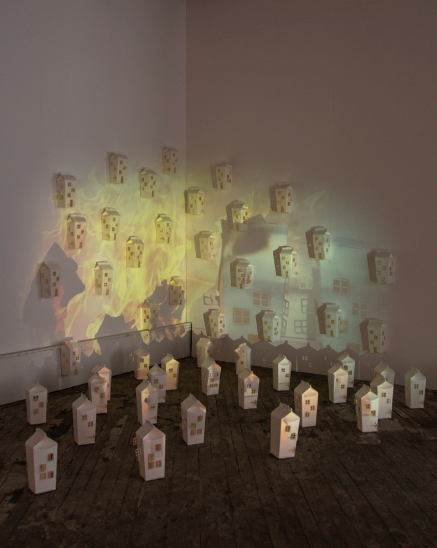Title
The Question of Feeling At Home
Year
2019
Category
Curator

A group exhibition at PS² (Paragon Studios / project space) Belfast
The Question of Feeling At Home offers contemporary angles on the 20th century’s notions and practices of feeling at home. The idea of a traditional family having a home cooked meal and then retiring to sit by the fire is often irrelevant in 2019. Our lives are organised in various alternative ways as traditional roles in the home are challenged or shared. Temporary living situations are more prevalent, and the structure of the family is viewed in a more fluid way.
The exhibition aims to be relevant to those living with intellectual disabilities, with the view of home-living raising questions of independence, support, and community. For these individuals feeling at home is often a wider social matter of being accepted as equals in the community, raising questions of independent and supported living.
The work is rooted in the meaning of the term as a comforting routine in a permanent residence, with each piece proposing a different critical view on home living.
The Question of Feeling At Home exhibits work contributed by a group of artists including artists who are intellectually disabled, giving agency within the field to voices and narratives not often present in the independent art world. The idea of domestic is thus represented differently, attached to objects, politics, and economies rather than permanent routines or places.
Participating artists:
David O’Regan, Sarah Smith, Matthew Calderwood, and Cecilia Bullo
David O’Regan: My life changed
completely when I was 21 yrs old and had a terrible car
accident. I`m lucky to be alive. I used to live an independent
life but now rely on my family to help me.
People say to me "You`re the same as everyone else". I know I`m
different no matter how much people say I`m not, I had to do
things a different way and I`m ok with that. To process things
now I have to completely blank my mind, take time to think about
whatever it is before I act. Now I find that there is always
someone looking over my shoulder. It`s because I need extra help
but it`s difficult sometimes.
For more information see DoublTAKE
Studios.
Sarah Smith is an emerging visual artist based
in Northern Ireland, and is currently studying for her Masters
degree in Fine Art at the University of Ulster in Belfast.
Sarah's work is multidisciplinary, encompassing installation,
performance, and lens based media and explores interpersonal
human issues psychological and emotional, and in recent years the
significance of action and gesture in performance art.
Deconstruction, Reconstruction seeks to both
symbolically and visually illustrate the deconstruction of
idealism and the deterioration endured as a result of trauma,
followed by the process of reconstruction post trauma and the idea
that we rebuild ourselves and our reality in order to work through
it.
For more information about Sarah Smith see.
Matthew Calderwood: I live in Hemsworth
Court supported housing. I used to work in the Ulster Weaving
Factory. When he was introduced to the hand weaving
loom, Matthew said that it brought back many fond memories of
working in the factory.
Matthew likes to weave as it relaxes him, he often has the TV on
in the background or music to help get him in the correct mindset.
The weaving loom that he has chosen to use is an easy model to
use, it is a wooden pegged weaving loom, operated by hand. When he
weaves, he likes to experiment using different textures, types of
wool, and various colours to create a ‘colour adventure’.
Cecilia Bullo is an Irish/Italian visual
artist based in Dublin. She studied Fine Art
at IADT Dún Laoghaire and Fine
Art Sculpture at the Brera Academy in
Milan. In 2009 she received her MFA in
Sculpture from NCAD, Dublin. Her practice has been
predominantly concerned with an investigation on ritualistic
processes and their psychological healing effects, although
her work is mainly sculpture based it incorporates different
mediums.
Based on Theodor De Bry's 16th century illustrations of a
Tupinambá tribe involved in anthropophagic practices, in The
Third Space Cecilia Bullo explores perspectives on
colonization. This work references Homi K. Bhabha's Third Space
Theory and anthropophagy as the cannibalistic appropriation of
cultural forms discussed by the Brazilian poet and polemicist
Oswald de Andrade in his 1928 Manifesto Antropófago.
For more information about Cecilia Bullo see.
Dr. Mary-Ann O'Donovan contributed an accompanying text for this exhibition, it is available here in .pdf format.
Dance Workshop
The exhibition closing event was a dance workshop by dance artist Aliina Lindroos (website) for the exhibiting artists and participants from Moon Base group in Belfast. Moon Base is a Paul Hamlyn funded project for and by people with Learning Disabilities. Run by The Black Box Trust, see.
Photos by Catherine Devlin